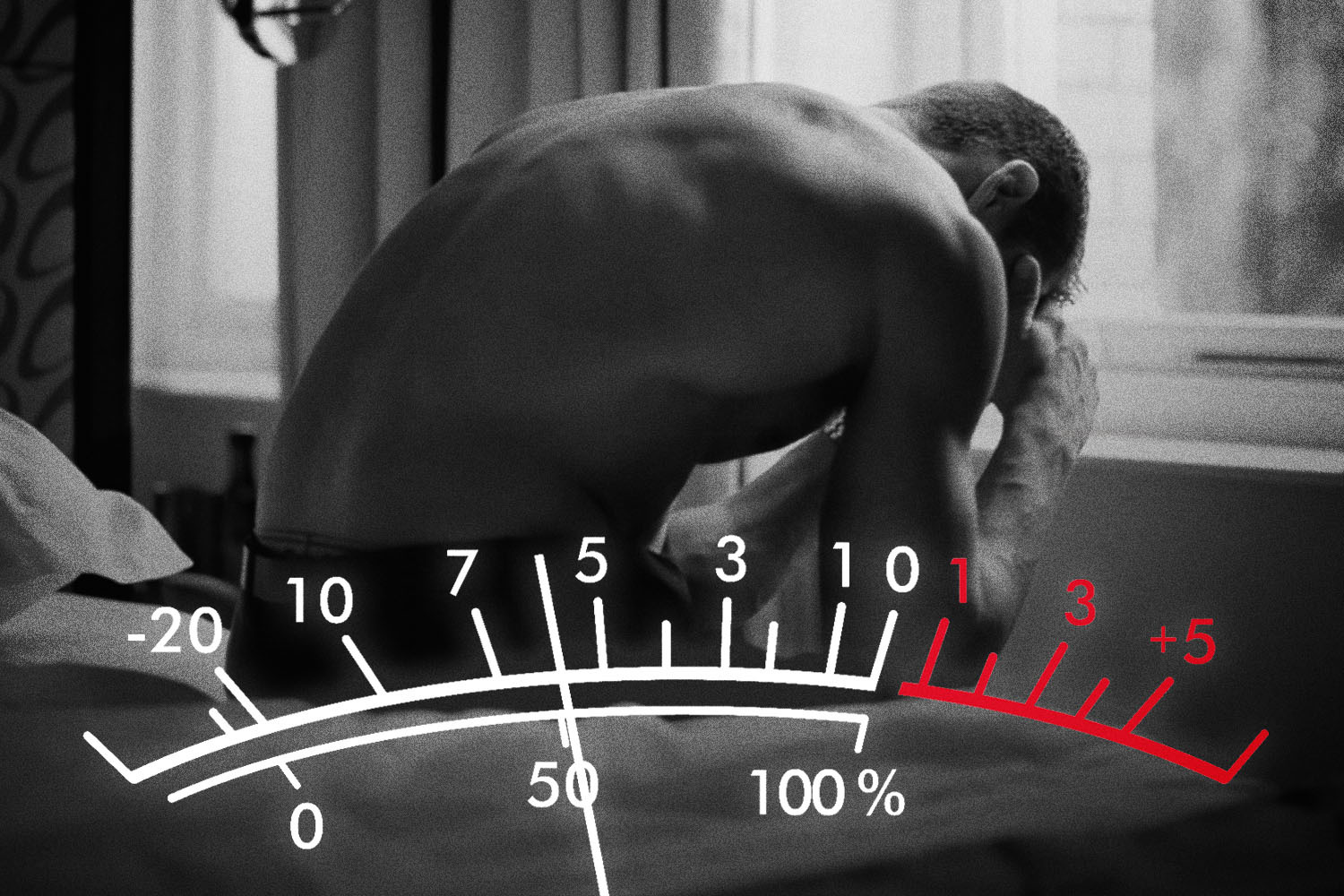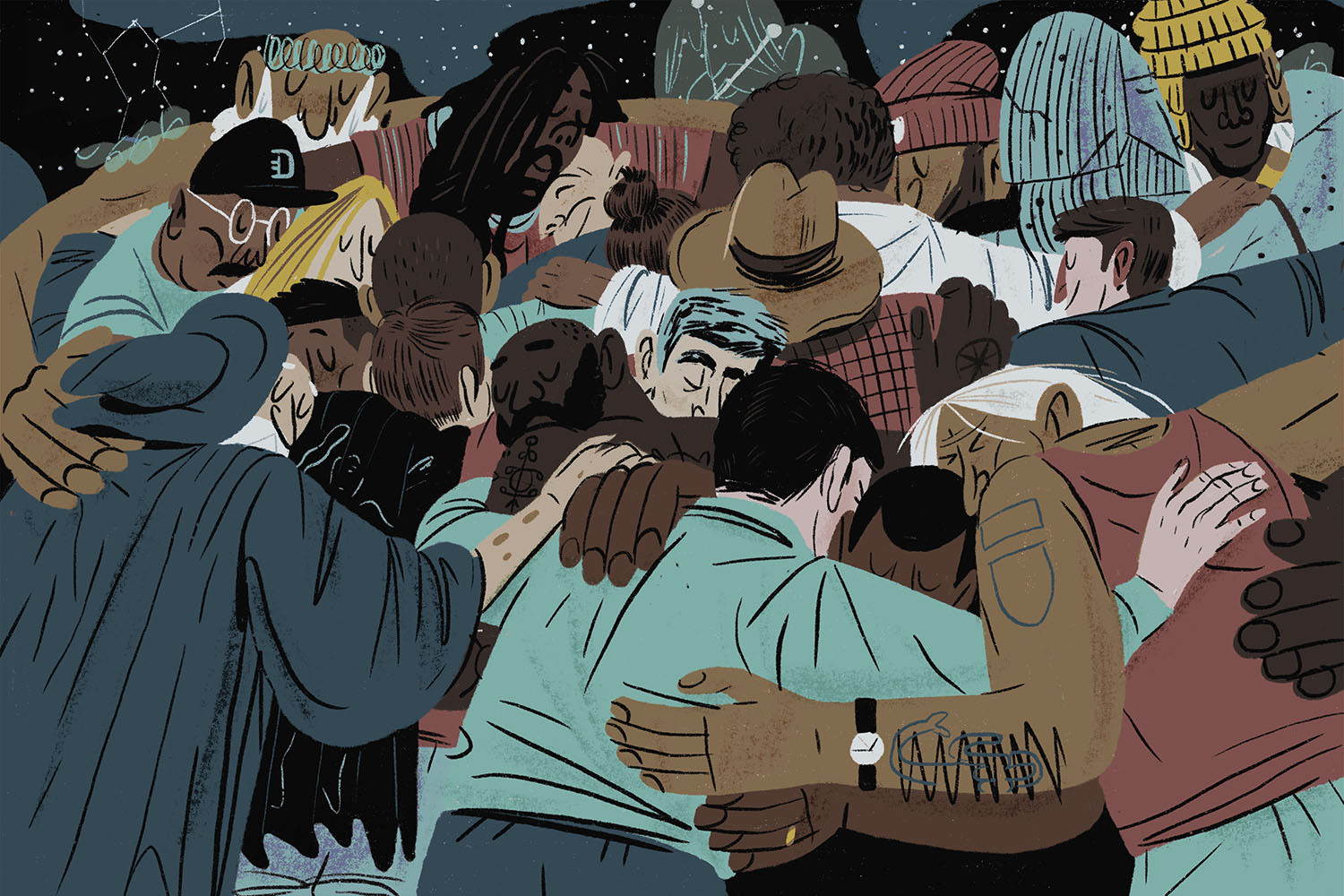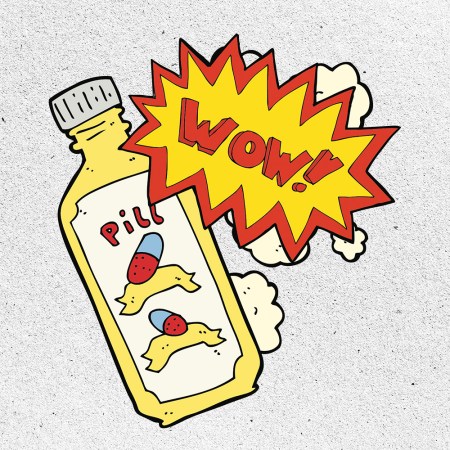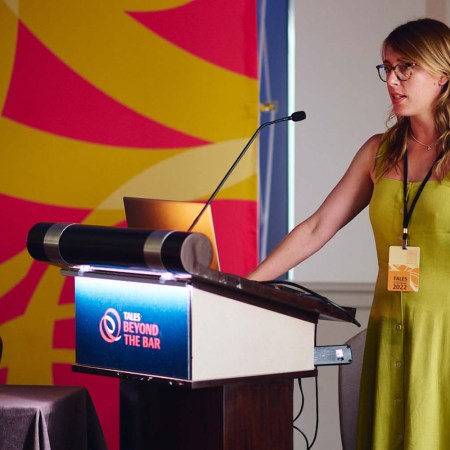When Angela was little she’d wake up and get ready for school, then help her mother, who was almost always nursing a hangover, get ready for work. She’d pack her mom’s lunch and place her work materials in her bag.
That wasn’t enough.
Angela, who was raised in Southern California and asked to be referred to by a pseudonym, says she was also “berated with this laundry list of all the things that I had done wrong, all the reasons why I’m not a good person.”
To stay out of her mother’s way — and to avoid seeing her cry and hearing her curse over being late — Angela would quietly wait in the car.
That wasn’t enough either. It was “disrespectful, apparently,” Angela says, because her mother felt rushed.
At other points in the day, if the dishes weren’t done or Angela left a book on a chair, her mother would lash out at her. During Angela’s late teens, on the rare afternoons that she was out of the house, her mom was “drinking herself silly and coming up with some reason or another to be upset when I came home.”
In trying to figure out a way to appropriately behave in the mind of her mother, Angela says, “There was no right answer.”
It was never enough.
Now 29, a wife of two years and a therapist in Northern California, Angela is part of a vast group of people often dubbed in mental health conversations as “adult children.” They’re recovering from a childhood under the care — or lack thereof — of alcoholics or otherwise dysfunctional parents. Due to the neglect, abuse or general poor parenting judgment on behalf of their immediate elders, these adult children are struggling to live comfortably and contently. That said, there are a growing number of resources at their disposal, including a subgenre of self-help books, a support group and an associated Reddit page, r/AdultChildren, with more than 38,000 community members and counting.
Dr. Lindsay Gibson, a psychotherapist and author of three self-help books on the topic, says a “central characteristic” of adult children is a sense that “in order for them to be a good person, they have to put other people’s needs and feelings first.” Because “all roads lead back” to their parents — and have throughout the lives of their kids — adult children have constantly been made to feel as though they are selfish, as if, somehow, they haven’t sacrificed enough to make their parents happy.
“The adult child is often not in touch with their own interior,” Gibson says. “They are not in touch with their feelings, their instincts, their intuitions, their impulses in a way that a normal, healthy person should be.” Adult children also “think twice about everything,” Gibson adds, and are “hypervigilant” about making a good impression on other people and pleasing them.
A 35-year-old man I’ll call David describes his own decision-making paralysis and clouded sense of identity. He was adopted by relatively older, wealthy parents, whom he says provided for him generously, but only as a way to control him. Sheltered as a child, he says his mother “lives in her own little world” and makes “everything about her.”
“She can even make other people’s birthdays about her,” David says.
While very intelligent, David says that his father is “like a child.” “It’s really embarrassing. He doesn’t take ‘no’ for an answer.” He’s prone to fits and asserts his will on others. When David recently divulged that he’d begun seeing a therapist, his father pushed him to try a different doctor, one his father knew personally.
“It seems like whenever I open my mouth, I’m disciplined into some sort of submissive silence,” David says. “I’m trying to be myself, but they want to have this family in their image.”
David often struggles to express himself adequately in conversation, speeding up his speech and constructing a wandering narrative that doesn’t circle back to a point. A straight male, David also has difficulty maintaining relationships with female partners. He says they’ll date for a little while, he’ll introduce them to his parents, and then, within a month, they break up. During the stressful early days of the pandemic lockdowns, David says he started ranting to himself about the pressures his father’s put on him, his mother’s reluctance to address the issue, and a growing sense of loss when he reflects on time spent in their clutches. He feels as if their influence has stunted his journey to becoming an independent, self-sufficient adult.
“There’s this constant feeling of what I do is wrong or I’m going to get in trouble,” David says. “I’m having a pretty big struggle with what I want in life.”
After living in Chicago and working as a massage therapist for a decade and a half, he’s now back in his home state of Maine, closer to his parents, and working as a property manager for his brother-in-law. Though we connected on the Adult Children subreddit, David says he’s not currently engaged in any formal mental health support in the form of one-on-one or group therapy.
While categorizing people like David as “adult children” might sound like an overstatement — who’s not still figuring themselves out in their 20s or 30s, after all? — the behavioral problems resulting from this sort of childhood trauma can persist far later into life if left unaddressed.
“I’ve had clients who’ve been dealing with the same issues with their parents from 22 to 72,” Gibson says.
Angela, who began to actively address her childhood traumas four years ago, is learning how to manage the impact of her alcoholic mom’s upbringing. She communicates her wants and needs to her husband, who himself was diagnosed with depression as a child, and has set boundaries with her mother. They only talk on the phone once in a while, she says. After experiencing difficulties in maintaining friendships throughout her formative years — in part because she imitated her mom’s behavior, drank a lot and quickly yelled at those whom she felt wronged her — she regularly meets with a group of pals to play Dungeons & Dragons.
“I finally have a truly and honestly safe space that is my own right now,” Angela says, becoming increasingly emotional as she speaks. “I’m actually starting to learn who I am as a person outside my trauma.”
She traces her trauma beginnings to when she was about three years old and suffered sexual abuse. Her father, who was still married to her mother back then, granted a male friend of his permission to take what Angela describes only as “inappropriate” photos. Dad was included in the pictures, and when her mother found out, she left her husband. Because he never wanted to pay child support, Angela says her father never took a full-time job. As her mother’s drinking and emotional abuse grew more intense, Angela became promiscuous at a disturbingly young age.
In fifth grade, Angela says she told her female classmates she could instruct them on how to please their boyfriends through kissing. “I started this pattern of luring other young girls into the restroom, and that’s where I would kiss them and I would essentially assault them,” Angela says.
By the time she was in middle school, her ultra-controlling mother gave Angela progesterone pills to keep her hormones balanced. Her mother wasn’t aware of the sexual shenanigans Angela was engaging in, but told her daughter that whatever “acting out” she did could be regulated with hormonal equilibrium. The progesterone “would knock me out,” Angela says. “I would just fall asleep and she didn’t have to deal with me anymore.”
In the morning, if Angela told her mother she had a headache or was dizzy, Mom left her home unattended. During that time off from school, at about 13 or 14 years old she posted photos of herself online to make contact with men. She sought sexual encounters with them — who she says were fully aware of her underage status — because according to her mother, “my only value was having genitals.”
Angela says she soon “got into the non-consensual kink scene.” “I willingly and intentionally put myself in situations where I could have been abducted or hurt or worse,” she says, “and by some miracle did not get the worst outcomes.”
Little by little, Angela gained independence. She got a job at a sandwich shop — which provided her some money, though her mom forced her to hand over percentages of her paychecks — and attended college a couple hours’ drive away. Angela met her now husband during her second semester and, for some unknown reason, her mother took to him. She let them date as long as Angela outlined precisely where they were going and when she’d return home.
Angela promised herself that she’d never lie to her mother, because such an act would only validate her mother’s charges that she was not to be trusted. But eventually Angela recognized that was only yet another ploy on the part of her mother to keep her restrained, so she’d make up stories and stay with her boyfriend’s family some weekends. She felt safe there, slept for long stretches, and saw what a healthy maternal figure could look like in her partner’s supportive mother.
But interacting with other people in the world was generally a hardship for Angela. She only realized in college that the things she did as a child were extreme and unsettling. The looks on people’s faces when she’d tell the tales was hint number one — something she says she became addicted to.
“I was a shock-value whore,” Angela says. “If I could get somebody to look at me and be all, like, Oh my god!, that was the ultimate high.”
For that reason, Angela does not attend support group meetings. “Once I start sharing anything about my story, someone will get wide eyed,” she says, “the sympathy gets there and it’s like a hit of a drug.”
Angela says she is a “lurker” on r/AdultChildren, the Reddit forum associated with the most prominent support group for people with issues like hers, Adult Children of Alcoholics/Dysfunctional Families. (I first came into contact with Angela through the Reddit group, and she says part of the reason she granted me an interview was because it would be over the phone, reducing the rush she might get from revealing her past to me and experiencing my response in person. She doesn’t post on Reddit or other social media platforms because she’s worried she’ll become “addicted to the likes.”)
An offshoot of the storied 12-Step, Alcoholics Anonymous program, according to its website, Adult Children of Alcoholics/Dysfunctional Families (ACA) “provides a safe, nonjudgmental environment that allows us to grieve our childhoods and conduct an honest inventory of ourselves and our family.” The website also says ACA “was founded on the belief that family dysfunction is a disease that infected us as children and affects us as adults.” The primary solution to overcoming the detrimental effects of a childhood rife with such trauma, ACA leaders believe, is to “become your own loving parent.”
“As ACA becomes a safe place for you,” the group’s website also says, “you will find freedom to express all the hurts and fears you have kept inside and to free yourself from the shame and blame that are carryovers from the past. You will become an adult who is imprisoned no longer by childhood reactions. You will recover the child within you, learning to accept and love yourself.”
While a group setting is not right for Angela, she does see a therapist one-on-one, and will engage with Reddit users she meets on the associated ACA page through email.
“I’m there to realize that I’m not alone, that I’m not the only person who had it this bad, that other people have been able to heal,” she says of the online forum. “It is a source of hope for me.”
Jennifer, a pseudonymous 22-year-old accountant in Colorado who was once removed from her parents’ care by the state due to their substance abuse, and has since been part of “toxic,” emotionally abusive relationships with men that she says mirrors her mom and dad’s turbulent marriage, also reads r/AdultChildren for inspiration.
“It’s super helpful,” Jennifer says. “So many people have overcome the hurdles that got put in place when they were young and have successful lives, and they’re not depending on the same things their parents did. They’re breaking the cycles. I know how hard that is and it’s encouraging to see.”
But Jennifer regularly posts and comments on r/AdultChildren as a means to help others as well. While she never earned a degree, she says she was trained in accounting at the age of 18, and has gained enough work experience to have the equivalent of a bachelor’s of science in the field. Because she’s been able to support herself financially, Jennifer’s grown increasingly independent from her parents. She’s also engaged in therapy and support-group help, and hopes the lesson’s she’s learned along the way — things like “it’s OK to have contradictory feelings about one thing,” or how to prioritize herself instead of others — will inform and comfort adult children with experiences similar to hers.
For other adult children, there are a large number of books about their plight and how to recover. Many have been published in just the past few years, including Dr. Lindsay Gibson’s, September release, Self-Care for Adult Children of Emotionally Immature Parents: Honor Your Emotions, Nurture Your Self, and Live with Confidence. She believes that, among other developments, the slowly dissolving stigma against mental health treatment has contributed to greater awareness of the problems that dysfunctional parents can cause for their kids once they’ve grown.
“There’s a general consciousness raising that’s going on in our culture that makes people more aware of some of these subtle traumas,” Gibson says.
This has led to increased mainstream media coverage of mental health concerns, including articles about the relationships between adult children and their parents published by the likes of The Atlantic and The Washington Post. But available literature on the topic is not only geared toward the woes of adult children. Parents may also have legitimate difficulty navigating the time period when their kids grow up, become independent and have a stronger sense of identity that might not jive with that of their parental figures. However, there’s also a series of books on the market — many of which lean heavily on faith-based answers to their problems — that play into the emotionally immature parents who blame their children for their collective relational troubles.
Dean Aslinia, Ph.D., a counselor and associate dean of the Mental Health Counseling program at University of Phoenix, says there are some parents who recognize the error of their ways after the fact. If these parents are emotionally well-adjusted and insightful enough to understand where they came up short, they could experience a great amount of guilt and shame over their kids’ challenges as adults. But Aslinia also notes that, generally, “the parents have the higher end of the responsibility” when their child can’t find their emotional footing as an adult.
Sometimes, the parents themselves had been abused as children, and while they are deserving of sympathy, Aslinia says in many cases such parents are “regurgitating what they learned from their parents,” paying that abuse forward to their children. “That doesn’t mean you get to blame the kid because they were a ‘bad kid,’” Aslinia says. “Even if they were the loving parents who simply enabled the kid, well, that’s still a problem. You can love somebody too much and the extremes on either end are still going to create a problem child that doesn’t know what the hell they’re doing [as an adult].”
For the adult child of a lacking parent who’s looking to cope, it’s best they target their energy inward.
“When you’re dealing with your emotionally immature parent, it can’t be your goal to change them,” Gibson says. “It’s to live your life in spite of them.”
“You received the only thing you could have received,” Aslinia says, addressing adult children of poor parenting. “It’s not ever your fault for being the child of that parent. However, don’t let yourself be a victim of being a child of that parent — be a survivor.”
Whether you’re looking to get into shape, or just get out of a funk, The Charge has got you covered. Sign up for our new wellness newsletter today.



























